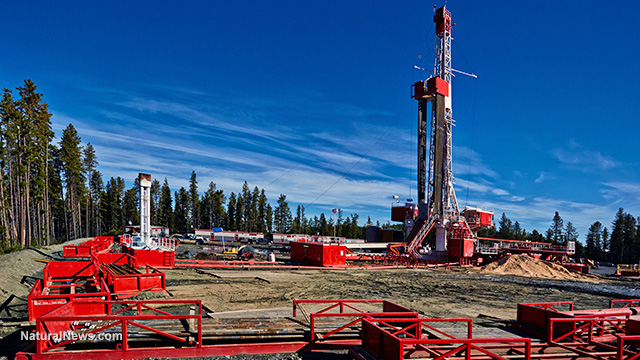Germany, France ban fracking indefinitely, while America expands environmentally destructive practice on public and tribal lands
Thursday, June 30, 2016 by: Jonathan Benson, staff writer
Tags: Germany, fracking, environmental protection

(NaturalNews) You most likely won't be hearing about flammable tap water or mysterious earthquakes in non-seismic zones in Germany anytime soon. That's because the European country's coalition government recently announced support for an indefinite ban on shale gas fracturing, with the exception of isolated test drilling per allowance by state governments.
Despite widespread industry support for the controversial practice, which involves blasting harsh chemicals and water into underground rocks in order to release trapped gas, Germany's "green" caucus has repeatedly said no-go, even if "fracking" might help lower energy costs and strengthen national energy sovereignty – and these sentiments seem to be swaying those with the power to keep a lid on fracking ever gaining momentum.
Germany had last year considered banning fracking, but a parliamentary vote was stalled when strife arose between Angela Merkel's conservative Christian Democrats (CDU) and the liberal Social Democrats (SPD). Now, the two parties have agreed to a ban, but under the condition that the German parliament will reassess the issue in 2021, a compromise that critics say is just a smokescreen for the eventual approval of fracking.
"The coalition's agreement on a fracking permission law is hair-raising," Hubert Weiger, head of Friends of the Earth Germany (BUND), told reporters. "The law must be stopped and replaced with a true fracking ban."
Europe's approach: when in doubt, always go with the precautionary principle
Even so, the law's approval would at least temporarily restrict fracking in Germany for another half-decade, bringing the country into alignment with France, its European Union sidekick, which has also banned fracking. Great Britain similarly has its own restrictions on the practice, only allowing it under strict environmental and safety guidelines.Germany has never approved even a single permit for fracking anyway, despite its legality up until this point. But now that the prospect of drillers setting up shop throughout Europe is becoming more of a reality, countries like Germany and France are realizing that unless proper safeguards are put in place now, their lands and livelihoods will eventually pay the price.
Germany is also reconsidering approval for glyphosate, the active ingredient in Monsanto's Roundup weedkiller, that's been linked to cancer tumors in rats. Following a World Health Organization (WHO) ruling that glyphosate is likely cancer-causing in humans as well, many countries – at least those that aren't completely controlled by chemical interests – are reevaluating whether or not to continue applying the chemical to their food crops.
The European Commission is poised to offer up a temporary 12–18 months extension for glyphosate, the permit for which is set to expire at the end of June. But strong opposition is pushing towards a ruling at least similar to that for fracking: ban it now as a precaution, rather than risk irreversible damage.
The U.S. approach: anything goes thanks to special interest corruption
Meanwhile, the American approach to threats like fracking and crop pesticides is to simply allow it all and ask questions later. Even the most basic efforts to protect our health and environment from harm (the Obama administration recently tried to outlaw fracking on public lands, only to have a federal judge in Wyoming rule it unconstitutional) are met with hostility from the ruling elite, nearly all of whom are fully controlled by special interests.Whatever happened to morality, or even basic ethics, when it comes to American policy? To see a day where our own nation's leaders actually consider the long-term impacts of chemically-intensive practices like fracking and industrial agriculture, rather than just dollar signs from their lobbyists, almost seems like a dream.
Sources for this article include:
Reuters.com
WSJ.com
Reuters.com
Science.NaturalNews.com
Germany at FETCH.news
Get independent news alerts on natural cures, food lab tests, cannabis medicine, science, robotics, drones, privacy and more.
More news on Germany
Take Action: Support Natural News by linking to this article from your website
Permalink to this article:
Embed article link: (copy HTML code below):
Reprinting this article:
Non-commercial use OK, cite NaturalNews.com with clickable link.
Follow Natural News on Facebook, Twitter, Google Plus, and Pinterest
- Newly released JFK files reveal Pentagon's role in creating Lyme disease and covid in the same lab
- Discovery of vast underground city beneath Giza pyramids challenges human history
- Black cumin seed oil emerges as a powerful ally against breast cancer and chronic inflammation
- Sugar-free deception: Artificial sweeteners hijack hunger signals, fuel obesity epidemic, study warns
- Kiss Your Genetic Privacy Good-Bye! 23andMe Gets Green Light to Sell Your Intimate Genetic Details to Anyone They Want
- Aluminum pollution: A silent threat to human health
- Dr. Suzanne Humphries makes bombshell appearance on Joe Rogan podcast, exposing vaccine industry deception back to POLIOMYELITIS
- Sweden's migrant crisis deepens as failed green energy venture leaves thousands jobless, exposes systemic collapse
- Is the vaccine-autism debate reopening? Washington Post sparks controversy with preemptive hit piece on David Geier
- A handful of pecans a day could keep heart disease at bay, study finds
- The mighty Eggplant: An underrated superfood with ancient roots
- Analysis: The coming economic collapse, a mass uprising and Trump's three secret weapons to halt the growing revolt
- The great crypto power struggle: How technocrats and governments are reshaping global finance
- Challenging the status quo: “America Fooled” by Timothy Scott exposes the myths about antidepressants
- RFK Jr. slashes HHS bureaucracy, saves taxpayers $1.8B while refocusing on chronic disease epidemic
- AI breakthrough slashes celiac disease diagnosis time from months to minutes
- HIGH-FAT FOOD DEPRESSION: Scientists discover why obesity takes away the pleasure of eating
- Understanding the difference: “Food Allergies and Food Intolerance” by Dr. Jonathan Brostoff and Linda Gamlin
- Newly released JFK files reveal Pentagon's role in creating Lyme disease and covid in the same lab
- Analysis: The coming economic collapse, a mass uprising and Trump's three secret weapons to halt the growing revolt
- Trump nominates VACCINE ZEALOT Susan Monarez to lead the CDC, sidelining RFK Jr.'s reform efforts
- Trump's greatest betrayal so far: Accelerating Middle East wars, silencing dissent, and serving Zionist masters
- Dr. Mike Yeadon releases 15-minute testimony - WATCH - about genocidal intent of COVID “vaccines”
- Festive flavors: The sweet history, nutritional profile and health benefits of pecan pie
- Elon Musk: Aliens could be here on Earth RIGHT NOW
- Big Pharma's $8 Billion bribery scheme exposed: how doctors are pushed to prescribe junk science, not heal
- 5 Simple steps to boost your brainpower: How to strengthen executive function in a distracted world
- Trump reverses course on Gaza plan, says “nobody is expelling Palestinians”
- A lack of integrity in Academia: Harvard professor found GUILTY of fraudulent research to promote CRT theory
- Reclaim your health: How midlife exercise reverses years of inactivity
- Survival 101: Effective EMF blocking techniques
- Florida takes a stand: DeSantis proposes permanent ban on mRNA vaccine mandates
- Sugarcane extract superior to cholesterol-lowering drugs?
- California's social media censorship law struck down: A victory for free speech or a threat to online safety?
- OpenAI whistleblower who dissented against how the company trained ChatGPT found dead
- EPA advisor admits the agency is funneling billions to climate groups ahead of Trump’s return to White House
- EPA advisor admits the agency is funneling billions to climate groups ahead of Trump’s return to White House
- Newly released JFK files reveal Pentagon's role in creating Lyme disease and covid in the same lab
- California's social media censorship law struck down: A victory for free speech or a threat to online safety?
- Dr. Mike Yeadon releases 15-minute testimony - WATCH - about genocidal intent of COVID “vaccines”
- The Health Ranger releases “Vaccine Zombie” song and music video, using AI-animated zombies for the music video
- The pandemic as a tool for INDOCTRINATION: Understanding “The Indoctrinated Brain” by Dr. Michael Nehls
- Florida takes a stand: DeSantis proposes permanent ban on mRNA vaccine mandates
- “Why we influenced the 2020 elections”: Facebook files reveal the coordinated effort to bury the Hunter Biden laptop story
- Mike Adams releases country western hit single: Goin’ Back in Time is Comin’ Home
- Mike Adams releases music poetry sensation: A Child of God
- Unpacking the Lies That We’ve Been Fed – new song and music video released by Mike Adams, the Health Ranger
- Michigan sheriff announces criminal investigation into 2020 election crimes, Dominion Voting Systems
- Migrants are taking advantage of recent hurricanes to scam residents and loot their homes
- House Intelligence Committee calls for the ARREST and PROSECUTION of Dr. Anthony Fauci
- RFK Jr. clears key hurdle: Sen. Susan Collins backs controversial HHS nominee, signaling a new era for health policy
- Rep. Nancy Mace introduces bill to ban biological males from female facilities on federal property
- Peter Rost exposes Big Pharma corruption in his book “The Whistleblower: Confessions of a Healthcare Hitman”
- Mike Adams releases new song and music video: Nothing More Disgusting Than a Globalist
- Red Cross issues warning to stop blood plasma donations from vaccinated people
- Scientists confirm: GENIUS brain function can be spontaneously unleashed in humans without any apparent cause
- EPA advisor admits the agency is funneling billions to climate groups ahead of Trump’s return to White House
- HYSSOP: What research reveals about the health benefits of this ancient holy herb
- Two containers with completed ballots fall out of truck in Florida
- Fully vaccinated about to see “tsunami” of illness and death, warns virologist
- Global leaders unite to clamp down on “misinformation” with UN-backed Cascais Declaration
- BREAKING: 2025 NDAA authorizes mandatory military draft of WOMEN across America… as Pentagon pursues global NUCLEAR war with both Russia and China at the same time
- Michael Yon warns of a ZIONIST TAKEOVER in Trump’s second administration
- BOMBSHELL: DNA testing kits are a SCAM to develop ethnic-specific bioweapons
- Ozempic and Wegovy weight loss drugs are injectable LIZARD VENOM PEPTIDES that may unleash a devastating wave of organ failure… side effects align with symptoms of SNAKE BITES
- Israeli soldiers accused of even more torture and abuse in the West Bank
- These 13 countries just signed an agreement to engineer a global FAMINE by destroying food supply
- NASA admits that climate change occurs because of changes in Earth’s solar orbit, and NOT because of SUVs and fossil fuels
- RFK Jr. clears key hurdle: Sen. Susan Collins backs controversial HHS nominee, signaling a new era for health policy
- Sermon 30: How Jesus reveals Caesar’s FAKE CURRENCY and FALSE AUTHORITY
- Coriander seeds: Ancient medicine backed by modern science
- Arizona officials claim Maricopa County needs 10-13 days to tabulate results of the election
Science News & Studies
Medicine News and Information
Food News & Studies
Health News & Studies
Herbs News & Information
Pollution News & Studies
Cancer News & Studies
Climate News & Studies
Survival News & Information
Gear News & Information
News covering technology, stocks, hackers, and more



"Big Tech and mainstream media are constantly trying to silence the independent voices that dare to bring you the truth about toxic food ingredients, dangerous medications and the failed, fraudulent science of the profit-driven medical establishment.
Email is one of the best ways to make sure you stay informed, without the censorship of the tech giants (Google, Apple, Facebook, Twitter, YouTube, etc.). Stay informed and you'll even likely learn information that may help save your own life."
–The Health Ranger, Mike Adams












































